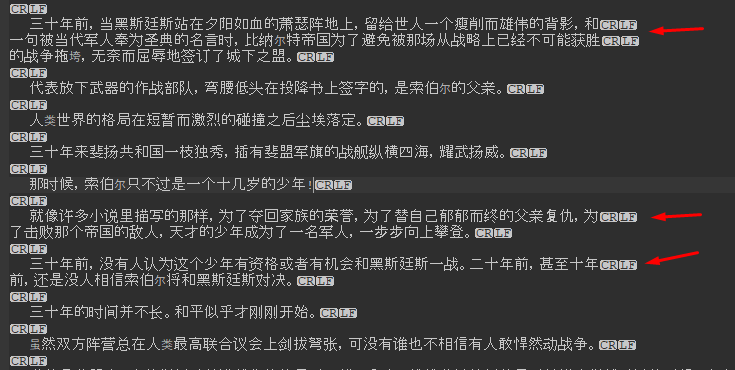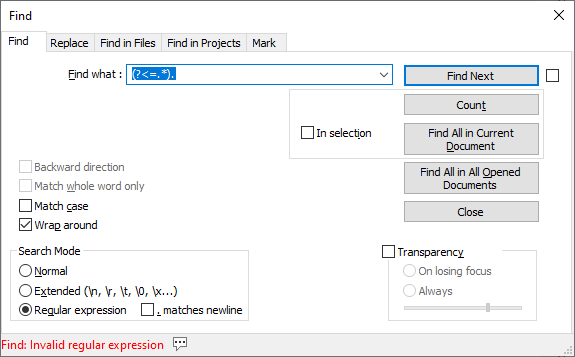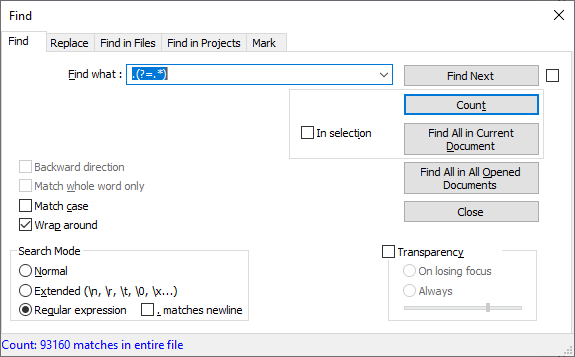Remove unwanted Carriage Return
-
Hi, first thank you for your help.
I’m reading a chinese novel using translator tool but the text file has unwanted Carriage Return for a long paragraph, it split the paragraph to multiple one. Hope someone can help me solve this problems

-
@alexander-hel @alexander-hel I’m going to assume there are no blank line between text lines that should be within a paragraph, and, that there is a blank line between paragraphs that you want preserved. If so, we can replace each single newline that occurs between non-newline text with a space.
Use Ctl-h to invoke Replace dialog.
Search mode: Regular Expression
Find:([\w|[[:punct:]]|[[:graph:]])\R([\w|[[:punct:]]|[[:graph:]])
Repl:$1 $2(if lines have no trailing space)
Repl:$1$2(if translator left in a trailing space)Now use Replace All to process the whole file, or Replace if you want to see how it works line by line. Ctl-z to undo.
I expect there are more elegant solutions.
If this does not meet your needs, you should supply sample text, preferably in a Literal Text Block as explained here.
-
A perhaps more elegant find expression is
(?<=[^\r\n])\R(?=[^\r\n])in which case replacement text is nothing or a single space.To the regular crowd of regex experts: I was thrown by the fact that these are invalid expressions:
(?<!\R)\R(?!\R)
(?<[^\R])\R(?=[^\R])My best explanation is that
\Rcan be either 1 or 2 bytes, but a look-behind must be fixed width. Any comment? -
@neil-schipper said in Remove unwanted Carriage Return:
A perhaps more elegant find expression is
(?<=[^\r\n])\R(?=[^\r\n])in which case replacement text is nothing or a single space.To the regular crowd of regex experts: I was thrown by the fact that these are invalid expressions:
(?<!\R)\R(?!\R)
(?<[^\R])\R(?=[^\R])My best explanation is that
\Rcan be either 1 or 2 bytes, but a look-behind must be fixed width. Any comment?Hi, thank you for your reply, I tried this expression
(?<=[^\r\n])\R(?=[^\r\n])and it worked flawlessly.Thank you so much
-
Hello, @alexander-hel, @neil-schipper, and All,
Yes, Neil, you’re right : just because of needed fixed length in look-behinds, the form
(?<!\R)\R(?!\R)is invalid as\Rmay match one or two consecutive charsAs for your second attempt, the parts
[^\R]just match any character-
But the uppercase
Rif theMatch caseoption is set -
But the letters
Randrif theMatch caseoption is not set
Now a solution is to use a fixed length in the look-behind part :
SEARCH
(?<!\n|\r)\R(?!\R)Note that, if the last line ends with a line-break, it’s also matched. Indeed, the part
(?!\R)is followed with nothing which is obviously different from\R)Best Regards,
guy038
-
-
Hi, @neil-schipper and All,
Oh…, I didn’t see that you already gave the right solution to the OP :
(?<=[^\r\n])\R(?=[^\r\n])Which is equivalent to my solution :
(?<!\n|\r)\R(?!\R)BR
guy038
-
@guy038 Thanks, Guy.
I’m noticing now why the 2nd regex I presented as invalid,
(?<[^\R])\R(?=[^\R]), is invalid: bad syntax due to missing = after <.After that fix, it’s merely wrong (since the fancy \R construct is not decoded when appearing inside
[]as you pointed out).Best,
Neil -
@neil-schipper said in Remove unwanted Carriage Return:
(?<!\R)\R(?!\R)
(?<[^\R])\R(?=[^\R])
My best explanation is that \R can be either 1 or 2 bytes, but a look-behind must be fixed width. Any comment?Since a negative look-behind must be fixed width, the way I use to get a valid expression is to replace
\Rby a\vor vertical tab, as follows:(?<!\v)\R(?!\R) -
@astrosofista said:
replace \R by a \v
Confirmed, and good to know, thanks. It’s strange that both constructs encode the 1 or 2 byte newline sequences, but only \v is valid.
a negative look-behind must be fixed width
Both positive and negative look-behinds have this limitation (perhaps what you meant to say).
-
@neil-schipper said in Remove unwanted Carriage Return:
Both positive and negative look-behinds have this limitation (perhaps what you meant to say).
Nope.
vs
Notice that only the lookbehind has the
pattern must be of fixed lengthcaveat; the lookahead can be variable width.And it’s very easy to test:
lookbehind

lookahead

-
@peterjones My comment pertains to the two kinds of look-behind, positive
(?<=and negative(?<!(and I’ve tested both), and makes no mention of the two kinds of look-aheads. -
replace \R by a \v
This doesn’t make sense in the desired usage above.
A\Rcan be one or two characters, thus not fixed length.
A\vis always only one character, when it matches. -
@alan-kilborn said in Remove unwanted Carriage Return:
A \v is always only one character, when it matches.
Good point. But @astrosofista’s trick does work with conventional UTF-8 \r\n line endings; it’s a more tolerant way of simply specifying \n, and would also handle other non-standard line ending formats.
Your comment reminds me that it’s risky to get too used to throwing \v around: if used in a matched text expression which will be replaced, it’s easy to inadvertently destroy a pristine file’s uniform line endings.
-
Sorry, I misread. Time to stop trying to think for the evening, apparently
-
@neil-schipper said in Remove unwanted Carriage Return:
@astrosofista’s \v trick does work with conventional UTF-8 \r\n line endings; it’s a more tolerant way of simply specifying \n, and would also handle other non-standard line ending formats.
I don’t think it has value. If you need to match \r\n then \v\v will match it, but it will also match other things (that maybe aren’t wanted), so…no real point in it.
-
@neil-schipper said in Remove unwanted Carriage Return:
Both positive and negative look-behinds have this limitation (perhaps what you meant to say).
Yes, that’s what I meant. My apologies for the possible misunderstanding.
Anyway, although both lookbehinds share such limitation, they differ because in the case of the positive lookbehind we have at our disposal the alternative of the operator \K, but no operator for the negative one.
It would be nice if this issue could be fixed sometime.
-
@astrosofista said in Remove unwanted Carriage Return:
It would be nice if this issue could be fixed sometime.
It’s just a coincidence that
\Kcan be used as a variable length positive lookbehind.
Because there is no equivalent for a negative lookbehind, doesn’t mean there’s an issue that could be “fixed”. -
@alan-kilborn said in Remove unwanted Carriage Return:
@astrosofista said in Remove unwanted Carriage Return:
It would be nice if this issue could be fixed sometime.
Because there is no equivalent for a negative lookbehind, doesn’t mean there’s an issue that could be “fixed”.
The lookbehind fixed-length restriction is caused by the Boost::regex library, not by anything Notepad++ does. So the issue would have to be fixed there.
To find more of the history of Boost::regex, and how long they’ve known about that restriction, I went to https://www.boost.org/doc/libs/ (I kept cutting stuff out of the 1.78 URL until I found a page that listed what other versions were available), and looked at old versions until I found the earliest Boost::regex that I noticed lookbehind syntax documented: v1.33.1 from 2004 – where they already note that restriction. If they’ve known about that limitation since 2004 and never gotten rid of that restriction, there’s probably a good technical reason that it’s too hard to implement, and it’s not likely to change anytime soon.
-
@peterjones said in Remove unwanted Carriage Return:
there’s probably a good technical reason that it’s too hard to implement, and it’s not likely to change anytime soon.
I think the limitation probably is rooted in runtime complexity for the engine that would provide a poor user experience (way too long for it to examine every possible match, potential for engine catastrophic overflow, etc.). Just my hunch.
-
@alan-kilborn @astrosofista @PeterJones
Open ended variable length negative look-behinds using subexpressions like
hello.*would have huge performance implications.Upper-bounded variable length expressions like
dog|puppyor\d{1,500}would be “easy-peasy” (ie, computers doing exactly what computer are good at doing), and extremely useful.